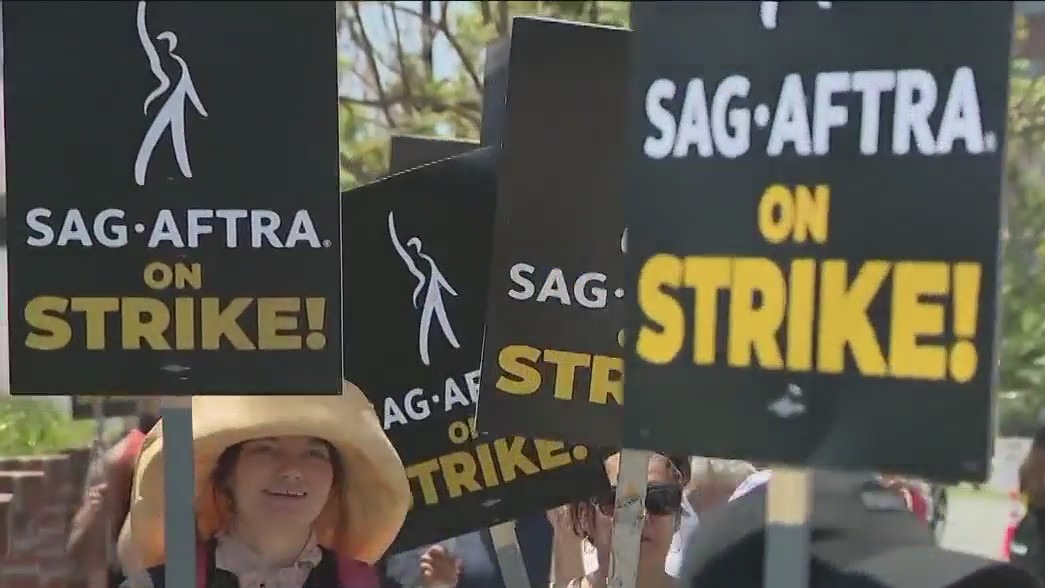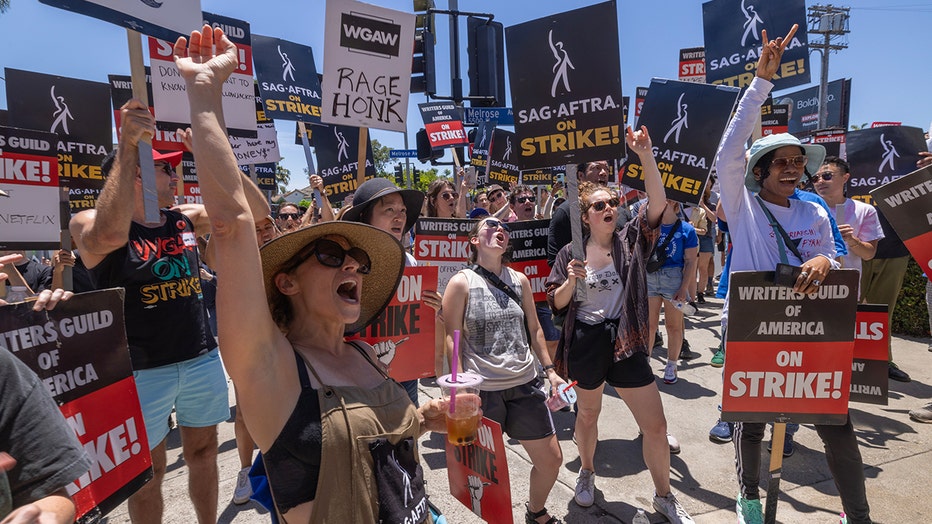Hollywood plunges into all-out war on the heels of COVID-19 pandemic, streaming revolution

Hollywood's entertainment industry on strike
Celebrities and elected officials were on the picket lines Monday in support of striking Hollywood writers and actors.
To get a sense of just how much animosity is flying around Hollywood these days, watch how Ron Perlman responded to a report that the studios aimed to prolong a strike long enough for writers to lose their homes.
Perlman, the hulking, gravel-voiced actor of "Hellboy," leaned into the camera in a since-deleted Instagram live video to vent his anger. "Listen to me, mother-(expletive)," Perlman said. "There’s a lot of ways to lose your house."
Three years after the pandemic brought Hollywood to a standstill, the film and TV industry has again ground to a halt. This time, though, the industry is engaged in a bitter battle over the how streaming — after advancing rapidly during the pandemic — has upended the economics of entertainment.
Having weathered plague, Hollywood is now fully at war in its own "Apocalypse Now" double feature. When tens of thousands Screen Actors Guild-American Federation of Television and Radio Artist hit the picket lines last week, joining 11,000 WGA screenwriters who have been on strike since May, a smaller clash went nuclear just in time for the release of "Oppenheimer." As striking actors and writers mobilized to mob studio lots and streamer headquarters, Puck’s Matthew Belloni wrote, "The town is burning to the ground."

Members of the Hollywood actors SAG-AFTRA union walk a picket line with screenwriters outside of Paramount Studios on the first day of the actors' strike on July 14, 2023 in Los Angeles, California. Members of SAG-AFTRA, Hollywood’s largest union whi
"You cannot change the business model as much as it has changed and not expect the contract to change, too," said Fran Drescher, SAG-AFTRA president, in a fiery press conference announcing the strike. "We’re not going to keep doing incremental changes on a contract that no longer honors what is happening right now with this business model that was foisted upon us.
"What are we doing?" she added. "Moving around furniture on the Titanic?"
Disaster also loomed in Hollywood when COVID-19 in March 2020 shuttered movie theaters, emptied TV studios and shut down all production. The recovery is still ongoing. Over the weekend, one of the first major film productions shut down by the pandemic – "Mission: Impossible – Dead Reckoning Part One" – only just reached theaters. And as its big-but-not-blockbuster opening showed, some of pre-pandemic Hollywood still just hasn’t returned. Box office remains about 20-25% off the pre-pandemic pace.

Hollywood actors go on strike
Hollywood actors are joining screenwriters in the first dual strike from the two unions in more than six decades, with huge consequences for the film and television industry. Here is a look at how it has played out, why it’s happening, and what could come next.
"We’ve talked about disruptive forces on this business and all the challenges we’re facing, the recovery from COVID which is ongoing. It’s not completely back," Disney chief executive Bob Iger said Thursday. "This is the worst time in the world to add to that disruption."
Though many of the demands of SAG-AFTRA and the Writers Guild of America are longstanding, much of the current dispute gathered force in the helter-skelter days of the pandemic. A digital land rush to streaming ensued, as studios, in many cases, hurried to craft their Netflix competitors. Subscriber growth became the top priority.
Rahul Telang, a Carnegie Mellon University professor and co-author of the book "Streaming, Sharing, Stealing: Big Data and the Future of Entertainment," says an entire era of change was condensed into two years.

Actors strike: Impacts immediate in movies, TV
Hollywood actors have joined a dual strike involving the screenwriters as of Friday morning. AJ Christian with Northwestern University joined LiveNOW from FOX's Josh Breslow to discuss the immediate impacts that will be felt.
"What is happening right now was bound to happen. With streaming, the whole business got disrupted," says Telang. "So naturally, they’re complaining, ‘We need our fair share.’ But how do you decide what’s a fair share? There has to be a transparency about where the money is coming from and where it’s going. Until this gets resolved, this issue will keep coming up."
The last time screen actors and writers struck simultaneously, in 1960, the guilds established royalty (later residual) payments for replays of films and TV episodes, among other landmark protections. If that strike reckoned with the dawn of television, this one does much the same for the streaming era.
But streaming, especially when companies carefully guard audience numbers, offers no easy metric like box office or TV ratings to establish residuals — long a foundational part of how writers and actors make a living. SAG-AFTRA is seeking a small percentage of subscriber revenue, with data measured by a third party, Parrot Analytics.
RELATED: Hollywood actors strike, joining writers in 1st industry-stopping walkout since 1960
The AMPTP, which negotiates on behalf of the studios, hasn't agreed to that but says the studios have offered actors "historic pay and residual increases," along with pension contributions and other other protections.
Meanwhile, actors are sharing images of their paltry residual payments for streaming hits. Kimiko Glenn of Netflix’s "Orange Is the New Black" posted a clip of residual payments totaling $27.30.
"You used to be able to work on a broadcast show, one show and you’re good for the year because of the residuals," said actor Nachayka Vanterpool on the picket lines. "And then you have streaming coming along and you got 20 cent residual checks. That impacts you."
Increasingly, it’s looking like everyone lost in the so-called streaming wars that went into hyperdrive under COVID-19. Since Wall Street last year began souring on subscription numbers being the be-all-end-all, most media companies have suffered stock declines. Wall Street's message turned to: Show us the profits.
At the same time, the drive to streaming has accelerated the demise of traditional television and its ad-based revenue. That’s led analysts like Michael Nathanson of MoffettNathanson to survey a fragmented entertainment business and forecast a "scary" second half of the year for media companies.
With traditional TV increasingly eroded by streaming, many studios have been cutting costs. Disney, Warner Bros. Discovery and Netflix all slashed jobs over the past year and a half. Streaming profitability has remained elusive. The Walt Disney Co. says Disney+ will get there in fall 2024. WarnerBros. Discovery, which has taken the extreme step of canning finished productions to reshape its streaming strategy, says Max will start marking money this year.
Many are now girding for a prolonged stoppage that, if carried into September, would greatly impact the fall TV schedule and the film festivals (Venice, Telluride, Toronto) that launch the season's awards contenders. Drescher said she "couldn't believe" how far apart her union and AMPTP are.
Ronny Regev, who penned the book "Working in Hollywood: How the Studio System Turned Creativity into Labor," thinks this strike could play out similarly to the 1960 stoppage, when actors struck for about a month but the writers strike dragged on.
"I hate to bring up the cliche but history repeats itself," says Regev. "Like in 1960, there’s a good chance the actors will reach a deal sooner than the writers. Now we’re dealing with very different companies. These are conglomerates that have other businesses. I’m not sure if (Amazon chairman Jeff) Bezos really cares."
There are also differences that favor the writers. In 1960, the strike by SAG (whose president was a then-Democrat Ronald Reagan) was fiercely opposed by some other guilds, including the International Alliance of Theatrical Stage Employees (IATSE), which represents below-the-line crew members. This time, the actors and writers have near-universal support throughout the guilds. IATSE, notably, is set to negotiate its own new contract next year.
"The urgency of this moment cannot be overstated. Our industry is at a crossroads, and the actions taken now will affect the future of labor relations in Hollywood and beyond," Matthew D. Loeb, IATSE president, said in a statement. "Their fight today foreshadows our fight tomorrow."
Cooler heads could prevail. Perlman, for his part, later apologized for getting so heated. He implored studio executive to find "a degree of humanity."
"It can't all be about your (expletive) Porsche and your (expletive) stock prices," said Perlman. "There's got to be dignity if we're going to hold a mirror up and reflect human experiences, which is what we do as actors and writers."
Aron Ranen contributed to this report.


